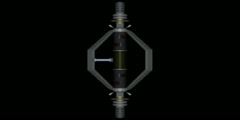Lec 65 - Marine Energy Technology: Waves and Currents
"Lec 65 - Marine Energy Technology: Waves and Currents" Margot Gerritsen, associate professor of Energy Resource Engineering at Stanford University, discusses the viability of marine energy technology. The Energy Seminar meets weekly during the academic year. For a list of upcoming talks, visit the events page at the Woods Institute for the Environment website. Stanford University: http://www.stanford.edu/ Woods Institute for the Environment at Stanford: http://woods.stanford.edu// Margot Gerritsen http://margot.stanford.edu/ Stanford University Channel on YouTube: http://www.youtube.com/stanford
Video is embedded from external source so embedding is not available.
Video is embedded from external source so download is not available.
Tags: Marine Energy Wave Tidal Ocean Alternative Renewable Clean Ecosystem
Uploaded by: stanfordenesemi ( Send Message ) on 04-09-2012.
Duration: 60m 0s
Here is the next lecture for this course
Lec 59 - Renewable Ocean Energy Conversio ...
56:12 | 4441 viewsLec 53 - Renewable Energy and the Economy
59:35 | 3739 viewsLec 33 - Energy Resources, Renewable Energy
47:39 | 4681 viewsLec 34 - Renewable Energy
48:03 | 4270 viewsGreen Careers: Clean Energy - Solar Power ...
02:04 | 9115 viewsLec 20 - The Energy Innovation Ecosystem
01:09:56 | 3161 viewsLec 4 - Wave Glider: An Autonomous Wave-P ...
01:09:24 | 3164 viewsLec 1 - Law 270.7 Introduction to Renew ...
01:15:15 | 3931 viewsLec 2 - Law 270.7 Federal Renewable Ener ...
01:34:48 | 3378 viewsLec 23 -Renewable Energy Policies
49:34 | 3271 viewsElectrostatic Fusion Machine - Clean and ...
02:00 | 4821 viewsLec 8 - Law 270.6 Resource Alternatives: ...
02:39:21 | 3548 viewsThe energy pyramid in ecosystem
05:33 | 10641 viewsLec 12 - Law 270.7 Waves, Tides, & Ocean ...
01:38:10 | 3215 viewsLec 31 - China's Influence on Solar Energy
46:49 | 3476 viewsNo content is added to this lecture.
This video is a part of a lecture series from of stanford
Lecture list for this course
Lec 1 - Scenarios of the Global Climate Energy System
Lec 2 - Wind, Water and Sunlight
Lec 3 - Low-Energy Building: European Design and Control
Lec 4 - California's Low-Carbon Fuel Standard
Lec 5 - Japan and the Future of Nuclear Energy
Lec 6 - The Status of Concentrating Solar Power Development
Lec 7 - Stanford's Energy Story: Present and Future
Lec 8- Transportation and Climate Change
Lec 9 - Global Cookstove Problems
Lec 10 - Renewable Power Entrepreneurship
Lec 11 - Canada's Oil Sands, Warts and All
Lec 12 - Energy Lessons from the Heartland
Lec 13 - Solar Geoengineering to Manage Climate
Lec 14 - Cap and Trade in California
Lec 15 - The Gulf Oil Spill: Where Did All the Oil Go?
Lec 16 - New York and Climate Change
Lec 17 - AB32 and Proposition 23
Lec 18 - Precourt Institute for Energy at Stanford: The Grand Challenge
Lec 19 - Precourt Institute for Energy at Stanford: The Grand Challenge
Lec 20 - The Energy Innovation Ecosystem
Lec 21 - Climate Change and Global Prosperity
Lec 22 - Does Biochar Deliver Carbon-Negative Energy?
Lec 23 - Nuclear Regulation in Our Era
Lec 24 - Global Transition to Electric Vehicles
Lec 25 - Nuclear Power: How, Why, Barriers
Lec 26 - Making Large Scale Solar Work
Lec 27 - Fuels from Sunlight Using Nano-Materials
Lec 28 - Consumer Responses to Electric Vehicles
Lec 29- The Way Forward with Electric Drive
Lec 31 - China's Influence on Solar Energy
Lec 32 - COP15 and the Stanford Student Experience
Lec 33 - The Energy Challenge and the Case for Fusion
Lec 34 - Controlling Climate Change After Copenhagen
Lec 35 - More Than 50% Wind on the Grid
Lec 36 - Transmission Siting Issues
Lec 38 - Demystifying and De-Jargoning the Smart Grid
Lec 39 - Global Climate Architectural Policy
Lec 40 - Communicating Climate Science in a Changing Media Landscape
Lec 41 - Solar Energy at Scale
Lec 42 - Solar Cell Technology in 2009 and Beyond
Lec 43 - Solar Photovoltaic Installation and Financing
Lec 44 - Economic Analysis of the Solar Industry
Lec 45 - Sustainable Energy Systems: Scale, Tradeoffs, and Co-Benefits
Lec 46 - U.S. Energy Future: Transportation Fuels
Lec 47 - Greenhouse Gas Emissions From Oil Substitutes
Lec 48 - Carbon Sequestration & Natural Gas Extraction
Lec 49 - LIFE: Laser Initial Fusion Energy System
Lec 50 - Adaptation to Climate Change
Lec 51 - Benefits of a Restructured Electric Industry
Lec 52 - Killers Apps for the Smart Grid
Lec 53 - Renewable Energy and the Economy
Lec 55 - Nuclear Sustainability and Climate Change
Lec 56 - Sequestering CO2 in the Built Environment
Lec 57 - A Pathway for Widespread Geothermal Energy
Lec 58 - Smart Grids & Decarbonizing the Power Sector
Lec 59 - Renewable Ocean Energy Conversion Systems
Lec 61 - New Ways for Regulating Greenhouse Gases
Lec 62 - The Real Story on Fuel Economy
Lec 64 - Nanomaterials for Batteries & Energy Storage
Lec 66 - William McDonough on Eco-Friendly Design
Lec 67 - Advanced Molecular Photovoltaics
Lec 68 - Equitable Climate Solutions: Stephen Pacala
Lec 70 - Evaluating Energy Solutions to Climate Change
















